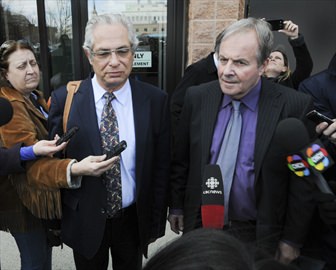A cancer-stricken Ontario First Nations girl whose court case drew national attention last fall is now receiving a mix of aboriginal and conventional health care – including chemotherapy – after her leukemia returned in March and her mother agreed to a blended treatment plan.
Justice Gethin Edward signed an addendum to his November ruling where he said the child, known in court only as J.J., has a constitutionally protected right to pursue traditional medicine over chemotherapy.
“This is simply a recognition of what’s in J.J.’s best interests,” said Edward after reading a clarification statement, which now will be attached to his earlier decision.
“It does no mischief to my decision to recognize that the best interests of the child remain paramount.”
In his clarification, Edward said there were “many calls” for the Ministry of the Attorney General to pursue litigation after his ruling but, instead, the government opted for dialogue with the family, McMaster Children’s Hospital, the Office of the Children’s Lawyer and the Six Nations band council.
To come up with the agreed upon wording was a great deal of hard work, said one lawyer, emphasizing that a child’s health must be the primary consideration in any decision about western or Haudenosaunee medicine.
After endorsing the clarification, Edward congratulated those involved in the complex case that saw McMaster Children’s Hospital push to have the child seized by Brant Family and Child Services last year.
A publication ban remains in effect protecting the identity of the girl and her family.
The court was told J.J.’s cancer, which was in remission last year during the court case, returned in March. She returned to chemotherapy and is now under the care of a health-care team that includes a doctor, senior pediatric oncologist, Haudenosaunee health-care provider and Haudenosaunee chief who practises traditional medicine.
She is not in treatment at McMaster.
The lawyer for the hospital, which could have chosen to appeal Edward’s decision, said McMaster is pleased with the clarification.
“McMaster (was) at all times focused on what they sincerely believed was in J.J.’s best interests,” said Daphne Jarvis.
“The hospital respects the decision made by the family and wishes her a full recovery.”
The Ministry of the Attorney General said in a statement Friday the clarification is important for both natives and those in healthcare.
“This clarification now allows the family to proceed, with peace of mind and privacy, with their daughter’s treatment using the best that both medicines have to offer,” says the statement.
“(It) also encourages governments, agencies, hospitals and health care practitioners to continue important conversations about an integrated approach to health care, one that respects and can bring together different healing traditions.”
Paul Williams, the lawyer for J.J.’s family, said that the ruling is a happy day for the family.
He said Edward’s original decision had placed the right to aboriginal medicine as an absolute rather than something to be considered.
“That was never anyone’s intention so Judge Edward has said the first thing anyone considers is the child’s best interest and the right to use a medicine is part of that process. That was clarified.”
Agencies/Canadajournal
 Canada Journal – News of the World Articles and videos to bring you the biggest Canadian news stories from across the country every day
Canada Journal – News of the World Articles and videos to bring you the biggest Canadian news stories from across the country every day



